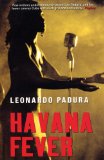Summary | Excerpt | Reviews | Beyond the Book | Read-Alikes | Genres & Themes | Author Bio

This article relates to Havana Fever
The Cuban bolero is the first internationally recognized music form to originate in Cuba. Closely related to trovador songs and habaneras, boleros are songs of romance, featuring themes of love and heartbreak. The music is most often slow, sensual and deeply romantic.
The Cuban bolero
is often confused with the Spanish bolero. The two forms arose independently,
apparently neither influencing the other. Whereas the Spanish bolero is always in 3/4 time, the Cuban version is in 2/4 or 4/4. In addition, the Cuban version is heavily influenced by African-based rhythms. The two styles are danced differently, as well; the Spanish bolero has couples dancing apart, while the Cuban bolero is danced by couples who are touching.
It is believed that the first Cuban bolero was composed by Jose Pepe Sanchez, a natural musician with no training or ability to read music. Much of what he wrote is lost, but some of his compositions were fortunately recorded for posterity by others who recognized the songs as revolutionary. The first known bolero is Sanchez's
Tristezas
("Sadness")
composed in 1883.
The form evolved over time as others adopted it. Miguel Matamoros became one
of the first internationally known bolero composers. He toured with his group,
Trio Matamoros, throughout Latin America and Europe during the 1940s. His
Lágrimas negras
("Black Tears")
is still widely performed. Another important figure, lyricist Adolfo Utrera,
started the trend of adapting well-known poetry for the bolero. His
Aquellos
Ojos Verdes ("Green Eyes") with music composed by Nilo Menéndez,
was recorded by Nat King Cole, a
testament to its popularity (lyrics with translation).
The bolero disappeared from Cuba after the Cuban Revolution in 1959, as the
clubs where the bolero was sung were closed down. Cuban music has enjoyed a
revival in recent years, however, in part due to the Academy Award-nominated documentary
Buena Vista Social Club (1999)
which featured music and
interviews with once-famous musicians, some of whom were in their 90s at the
time of the taping. The Grammy-winning soundtrack includes music from
Ibrahim
Ferrer, considered the last of the great bolero singers from pre-Castro
Cuba. Ferrer continued to tour until his
death in 2005 at the age of 78. His posthumously-released album, Mi Sueño, was devoted entirely to the Cuban bolero.
Filed under Places, Cultures & Identities
![]() This article relates to Havana Fever.
It first ran in the May 21, 2009
issue of BookBrowse Recommends.
This article relates to Havana Fever.
It first ran in the May 21, 2009
issue of BookBrowse Recommends.
Your guide toexceptional books
BookBrowse seeks out and recommends the best in contemporary fiction and nonfiction—books that not only engage and entertain but also deepen our understanding of ourselves and the world around us.